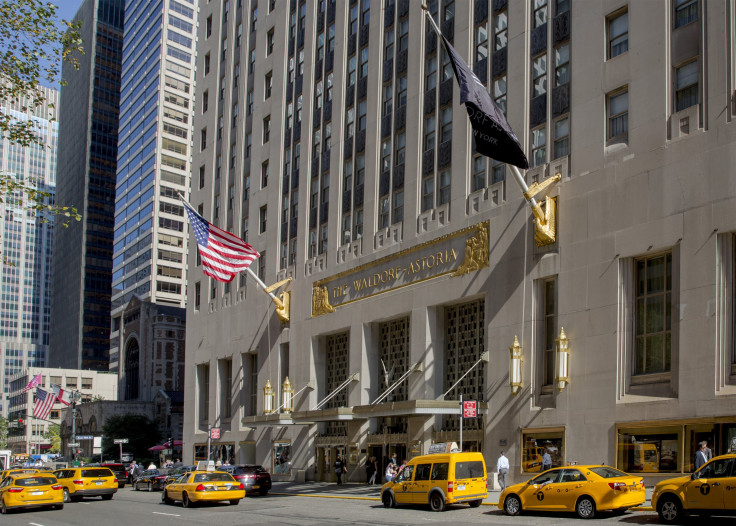Anbang's Starwood, Strategic Hotel Deals: Why The Chinese Insurer Is Investing In The US Hospitality Sector

For China's Anbang Insurance Group Co., U.S. hotel chains are the hottest thing on the market right now.
At least, that's what the company's latest negotiations and deals — particularly Monday's unsolicited offer to buy Starwood Hotels & Resorts Worldwide Inc. for $12.8 billion — suggest as it embarks on a buying spree that puts Chinese companies on track to break records in foreign acquisitions.
But it's not the hotel companies themselves, nor the hospitality industry as a whole, that are most attractive to Anbang, some suggest. Chinese companies are looking to park funds in U.S. industries and companies that have strong returns on investment amid economic stagnation in China, and hotel chains offer big names and prime real estate that appeal to overseas investors, experts say.
Already, the real estate and hospitality sector is one of the biggest draws for Chinese investment. The Rhodium Group, which tracks Chinese direct investment in the U.S., reports that Chinese companies made 39 hospitality-related deals worth more than $5.1 billion in 2015, out of a total of $15.7 billion and 171 deals that year.
"I think it has to do with the profile; I think it has to do with the actual land and the bricks," said Edward Mermelstein, a real estate attorney in New York City who has Chinese clients. "It appears that there's a greater need to deploy the cash than do the due diligence that precedes the deployment of the cash."
Anbang has not only made an unsolicited offer to buy Starwood, owner of the Westin and Sheraton hotel brands, it also closed a deal Monday to buy Strategic Hotels & Resorts Inc., a U.S. company that owns luxury properties from the InterContinental in Chicago to the Ritz-Carlton at Half Moon Bay in California, for $6.5 billion from Blackstone Group.
That's in addition to New York's Waldorf Astoria, which Anbang bought in October 2014 for $2 billion. Anbang's press release announcing the purchase of the storied property described it as being "to achieve a stable return." It added that the company "intends to realize long-term stable investment return by investing in high-quality real properties in North America."
All of these moves are "very much so" financial plays, Mermelstein said. Chinese companies "need to deploy these huge amounts of nonperforming cash positions into performing cash positions," he explained. To achieve high levels of investment return, "there are very few options today other than the U.S. market," he added.
Given the current financial turmoil in China, the stability, not just potential financial returns, of U.S. properties is only more appealing, experts have said. The United States was the top country for outbound Asian investment, led by China, in the first half of 2015, the World Property Journal reports.
Headquartered in Beijing, Anbang Insurance Group is one of China’s largest insurance companies. Its subsidiaries are involved in everything from asset management to insurance brokerage and have bought a slew of non-Chinese companies in recent years, from Delta Lloyd Bank Belgium in December 2014 to U.S insurance company Fidelity & Guaranty Life in November.
Anbang is splashiest of Chinese investors in property deal spree https://t.co/y5vqJkdntu pic.twitter.com/DgUP3ON8iy
— Bloomberg Markets (@markets) March 14, 2016
With its offer to buy Starwood, Anbang barged into existing negotiations for Marriott International Inc. to purchase Starwood for about $11 billion. It could be a sign that Anbang is not so much perusing hard numbers as it is pursuing hot deals.
"The risk is high," Mermelstein warned. "My experience is that they typically look at very high-profile transactions, and for them the attraction is more having to do with the size and the profile of the transaction," he said, citing as evidence the fact that Anbang had inserted itself in the middle of the high-profile talks between Marriott and Starwood.
Still, these acquisitions and Chinese interest in U.S. and other foreign properties are unlikely to dwindle anytime soon. Since January, Chinese companies have done outbound acquisition deals worth more than $84 billion, compared to $108 billion of such deals last year, the Wall Street Journal reported. With their country's economic recovery nowhere on the horizon, Chinese companies will continue to turn elsewhere to make their money work for them.
© Copyright IBTimes 2024. All rights reserved.





















